Muhammad Shayan
Few-shot Question Generation for Personalized Feedback in Intelligent Tutoring Systems
Jun 08, 2022



Abstract:Existing work on generating hints in Intelligent Tutoring Systems (ITS) focuses mostly on manual and non-personalized feedback. In this work, we explore automatically generated questions as personalized feedback in an ITS. Our personalized feedback can pinpoint correct and incorrect or missing phrases in student answers as well as guide them towards correct answer by asking a question in natural language. Our approach combines cause-effect analysis to break down student answers using text similarity-based NLP Transformer models to identify correct and incorrect or missing parts. We train a few-shot Neural Question Generation and Question Re-ranking models to show questions addressing components missing in the student answers which steers students towards the correct answer. Our model vastly outperforms both simple and strong baselines in terms of student learning gains by 45% and 23% respectively when tested in a real dialogue-based ITS. Finally, we show that our personalized corrective feedback system has the potential to improve Generative Question Answering systems.
A New Era: Intelligent Tutoring Systems Will Transform Online Learning for Millions
Mar 03, 2022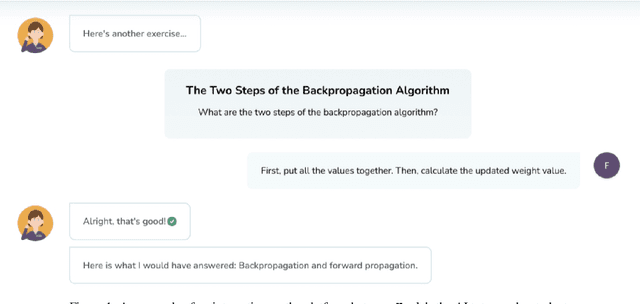
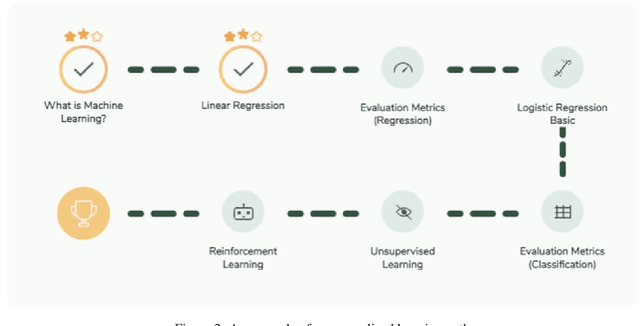
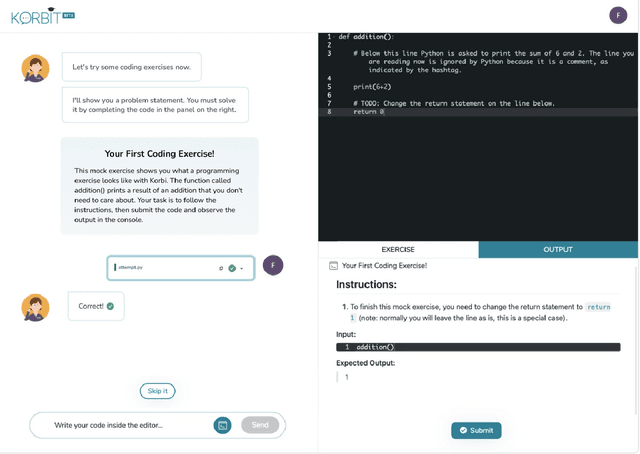
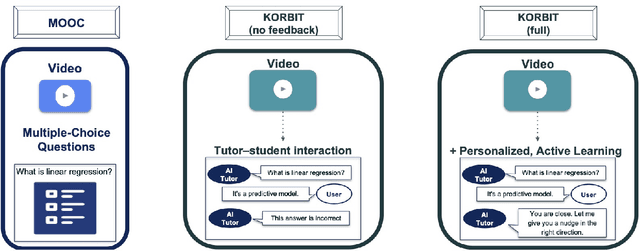
Abstract:Despite artificial intelligence (AI) having transformed major aspects of our society, less than a fraction of its potential has been explored, let alone deployed, for education. AI-powered learning can provide millions of learners with a highly personalized, active and practical learning experience, which is key to successful learning. This is especially relevant in the context of online learning platforms. In this paper, we present the results of a comparative head-to-head study on learning outcomes for two popular online learning platforms (n=199 participants): A MOOC platform following a traditional model delivering content using lecture videos and multiple-choice quizzes, and the Korbit learning platform providing a highly personalized, active and practical learning experience. We observe a huge and statistically significant increase in the learning outcomes, with students on the Korbit platform providing full feedback resulting in higher course completion rates and achieving learning gains 2 to 2.5 times higher than both students on the MOOC platform and students in a control group who don't receive personalized feedback on the Korbit platform. The results demonstrate the tremendous impact that can be achieved with a personalized, active learning AI-powered system. Making this technology and learning experience available to millions of learners around the world will represent a significant leap forward towards the democratization of education.
Comparative Study of Learning Outcomes for Online Learning Platforms
Apr 15, 2021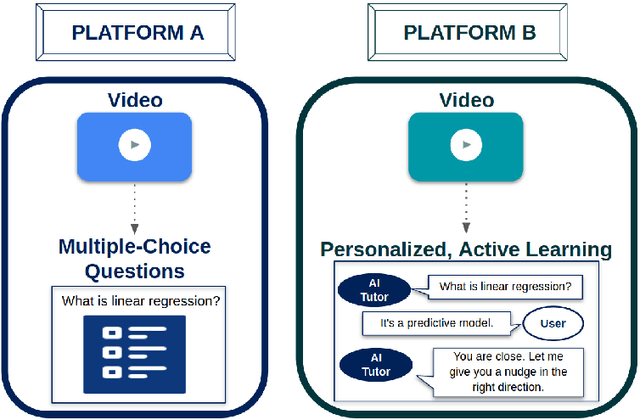

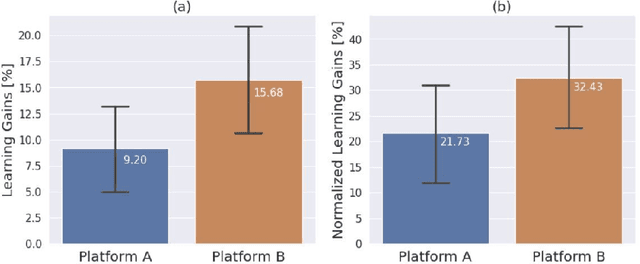
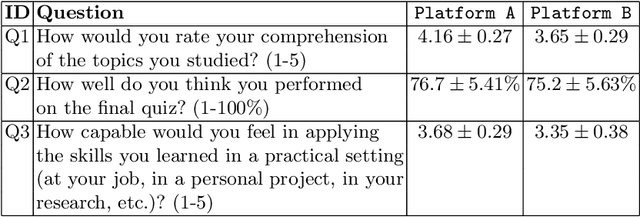
Abstract:Personalization and active learning are key aspects to successful learning. These aspects are important to address in intelligent educational applications, as they help systems to adapt and close the gap between students with varying abilities, which becomes increasingly important in the context of online and distance learning. We run a comparative head-to-head study of learning outcomes for two popular online learning platforms: Platform A, which follows a traditional model delivering content over a series of lecture videos and multiple-choice quizzes, and Platform B, which creates a personalized learning environment and provides problem-solving exercises and personalized feedback. We report on the results of our study using pre- and post-assessment quizzes with participants taking courses on an introductory data science topic on two platforms. We observe a statistically significant increase in the learning outcomes on Platform B, highlighting the impact of well-designed and well-engineered technology supporting active learning and problem-based learning in online education. Moreover, the results of the self-assessment questionnaire, where participants reported on perceived learning gains, suggest that participants using Platform B improve their metacognition.
Biscotti: A Ledger for Private and Secure Peer-to-Peer Machine Learning
Nov 27, 2018



Abstract:Centralized solutions for privacy-preserving multi-party ML are becoming increasingly infeasible: a variety of attacks have demonstrated their weaknesses. Federated Learning is the current state of the art in supporting secure multi-party ML:data is maintained on the owner's device and is aggregated through a secure protocol. However, this process assumes a trusted centralized infrastructure for coordination and clients must trust that the central service does not maliciously use the byproducts of client data. As a response, we propose Biscotti: a fully decentralized P2P approach to multi-party ML, which leverages blockchain primitives to coordinate a privacy-preserving ML process between peering clients. Our evaluation demonstrates that Biscotti is scalable, fault tolerant, and defends against known attacks. Biscotti is able to protect the performance of the global model at scale even when 48 percent of the adversaries are malicious, and at the same time provides privacy while preventing poisoning attacks.
 Add to Chrome
Add to Chrome Add to Firefox
Add to Firefox Add to Edge
Add to Edge